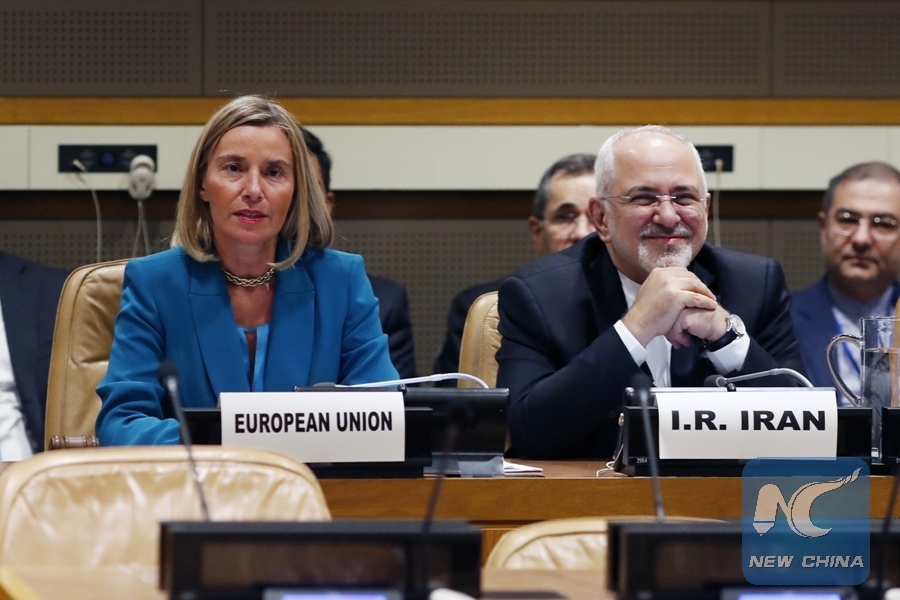
European Union (EU)'s foreign and security policy chief Federica Mogherini (L, front) and Iranian Foreign Minister Mohammad Javad Zarif (R, front) react during a meeting of foreign ministers from Iran, Britain, China, France, Germany and Russia at the UN headquarters in New York, Sept. 24, 2018. (Xinhua/Li Muzi)
UNITED NATIONS, Oct. 2 (Xinhua) -- Iranian Foreign Minister Mohammad Javad Zarif warned on Tuesday against the prospect of his country being forced to leave an international agreement on Iran's nuclear program.
"I can assure you that if Iran is forced to decide ... to leave the JCPOA, and if Europe, China and Russia will not be able to guarantee Iranian benefits from the JCPOA, we will be in a position that we cannot continue -- not because we are in rush for anything, but because it will be a matter of national dignity," said Zarif, using the official name of the July 2015 deal -- The Joint Comprehensive Plan of Action.
The U.S. withdrawal from the Iran nuclear deal has complicated the complex international situation, Zarif told an event hosted by the Austrian mission to the United Nations on lessons from the Iran nuclear deal.
"If we are forced to leave that agreement, I can assure you that we will not be able to get a similar deal. I can assure you that the United States will never be able to get a better deal -- and Iran will probably not get a better deal."
He warned against attempts for a zero-sum game, obviously in reference to U.S. President Donald Trump's attitude toward the Iran nuclear deal that his predecessor Barack Obama entered alongside Britain, China, France, Germany and Russia.
Trump decided in May to pull out of the deal and to re-impose sanctions on Iran.
After the U.S. withdrawal, the remaining five powers have been trying to keep the deal with Iran afloat.
The foreign ministers of the five powers and Iran met on Sept. 24 in New York to reaffirm their support for the deal.
After chairing the meeting, EU's foreign affairs and security policy chief Federica Mogherini said the EU will set up a legal entity to circumvent U.S. sanctions. The EU action immediately drew fire from Washington, saying the EU move was unacceptable.
Zarif on Tuesday called for a multilateral approach instead of a mentality of winning it all.
"You go for zero sum, you go to win it all, you make yourself vulnerable to losing it all," he warned. "Those who wanted to win it all in Syria are now facing the prospect of losing it all in Syria. Those who wanted to win it all in Yemen are now facing the prospect of losing it all in Yemen."
Any attempt to win at the expense of others can lead to losing -- and it doesn't mean the other side has won, it means the other sides has lost a bit less than you have, he said.
"If we really truly believe in multilateralism, we need to cultivate this new paradigm that we have to work for a positive-sum game, that we have to put ourselves in the shoes of the other side, that we have to start listening," he said. "The more complicated the international scene would become, the more we would need to cultivate this mentality."

